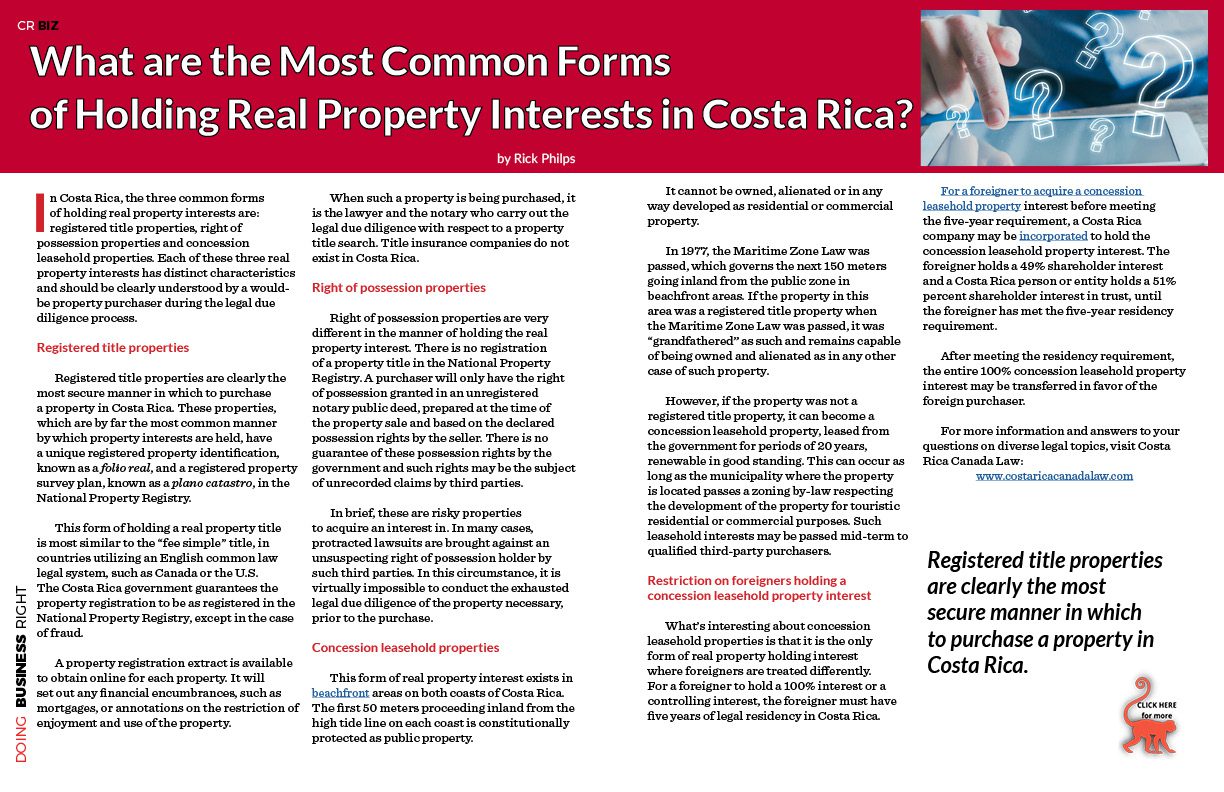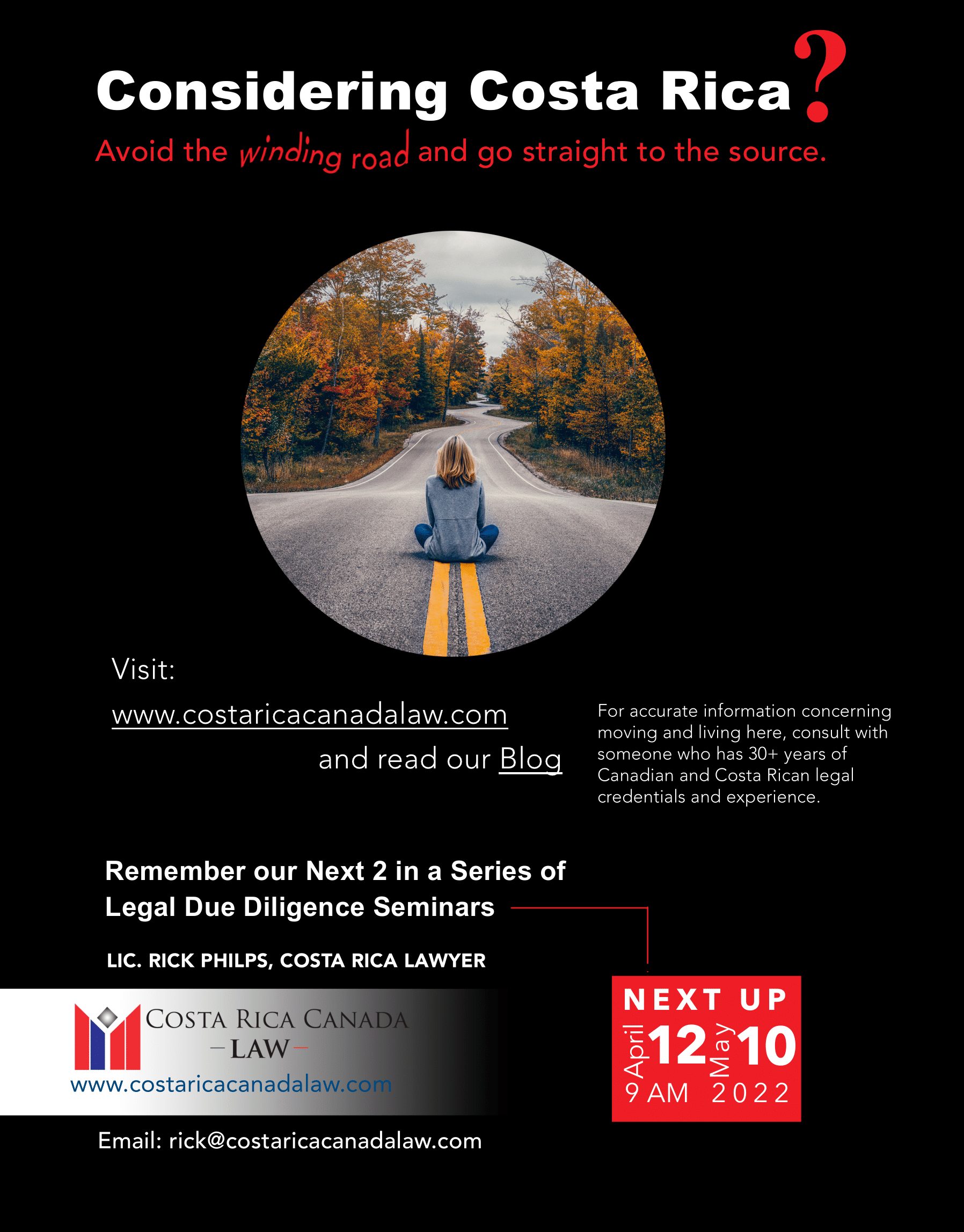
What are the Most Common Forms of Holding Real Property Interests in Costa Rica?
In Costa Rica, the three common forms of holding real property interests are: registered title properties, right of possession properties and concession leasehold properties. Each of these three real property interests has distinct characteristics and should be clearly understood by a would-be property purchaser during the legal due diligence process.
Registered title properties
Registered title properties are clearly the most secure manner in which to purchase a property in Costa Rica. These properties, which are by far the most common manner by which property interests are held, have a unique registered property identification, known as a folio real, and a registered property survey plan, known as a plano catastro, in the National Property Registry.
This form of holding a real property title is most similar to the “fee simple” title, in countries utilizing an English common law legal system, such as Canada or the U.S. The Costa Rica government guarantees the property registration to be as registered in the National Property Registry, except in the case of fraud.
A property registration extract is available to obtain online for each property. It will set out any financial encumbrances, such as mortgages, or annotations on the restriction of enjoyment and use of the property.
When such a property is being purchased, it is the lawyer and the notary who carry out the legal due diligence with respect to a property title search. Title insurance companies do not exist in Costa Rica.
Right of possession properties
Right of possession properties are very different in the manner of holding the real property interest. There is no registration of a property title in the National Property Registry. A purchaser will only have the right of possession granted in an unregistered notary public deed, prepared at the time of the property sale and based on the declared possession rights by the seller. There is no guarantee of these possession rights by the government and such rights may be the subject of unrecorded claims by third parties.
In brief, these are risky properties to acquire an interest in. In many cases, protracted lawsuits are brought against an unsuspecting right of possession holder by such third parties. In this circumstance, it is virtually impossible to conduct the exhausted legal due diligence of the property necessary, prior to the purchase.
Concession leasehold properties
This form of real property interest exists in beachfront areas on both coasts of Costa Rica. The first 50 meters proceeding inland from the high tide line on each coast is constitutionally protected as public property. It cannot be owned, alienated or in any way developed as residential or commercial property.
In 1977, the Maritime Zone Law was passed, which governs the next 150 meters going inland from the public zone in beachfront areas. If the property in this area was a registered title property when the Maritime Zone Law was passed, it was “grandfathered” as such and remains capable of being owned and alienated as in any other case of such property.
However, if the property was not a registered title property, it can become a concession leasehold property, leased from the government for periods of 20 years, renewable in good standing. This can occur as long as the municipality where the property is located passes a zoning by-law respecting the development of the property for touristic residential or commercial purposes. Such leasehold interests may be passed mid-term to qualified third-party purchasers.
Restriction on foreigners holding a concession leasehold property interest
What’s interesting about concession leasehold properties is that it is the only form of real property holding interest where foreigners are treated differently. For a foreigner to hold a 100% interest or a controlling interest, the foreigner must have five years of legal residency in Costa Rica.
For a foreigner to acquire a concession leasehold property interest before meeting the five-year requirement, a Costa Rica company may be incorporated to hold the concession leasehold property interest. The foreigner holds a 49% shareholder interest and a Costa Rica person or entity holds a 51% percent shareholder interest in trust, until the foreigner has met the five-year residency requirement.
After meeting the residency requirement, the entire 100% concession leasehold property interest may be transferred in favor of the foreign purchaser.
For more information and answers to your questions on diverse legal topics, visit Costa Rica Canada Law: www.costaricacanadalaw.com


